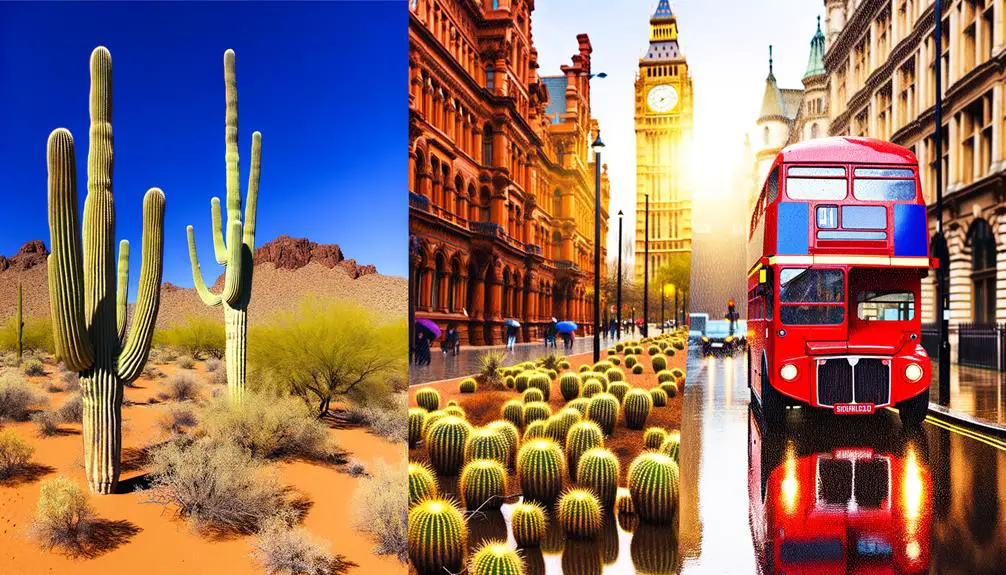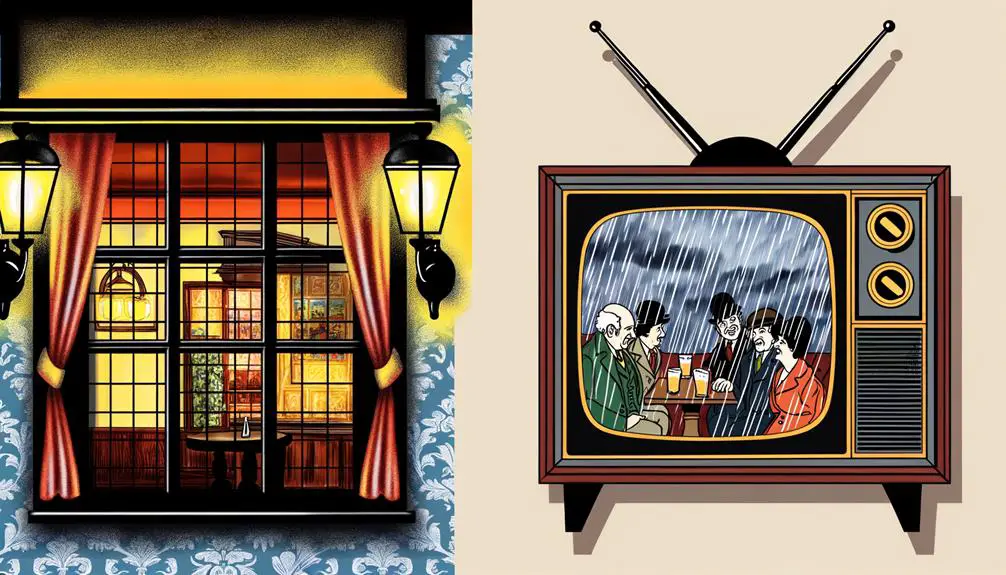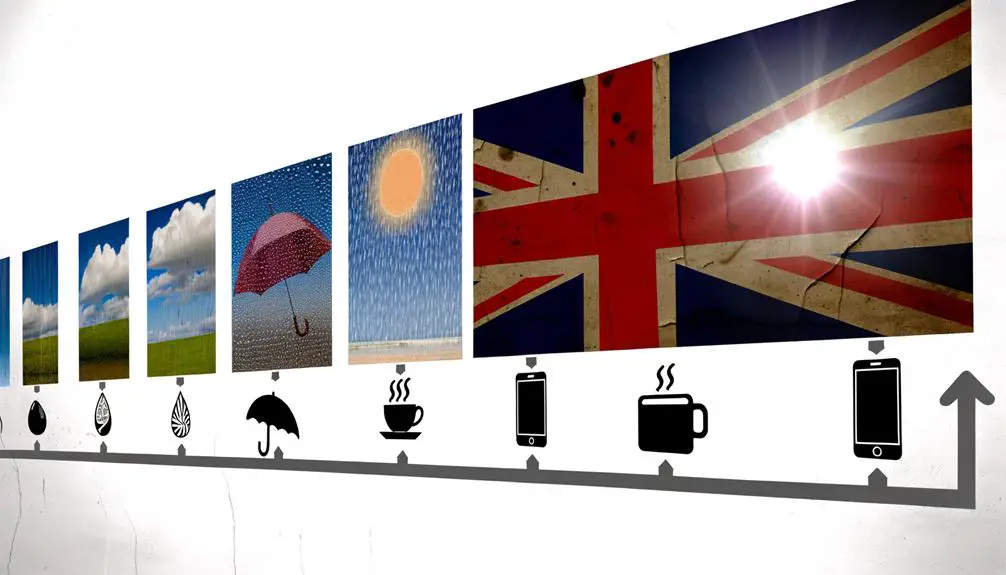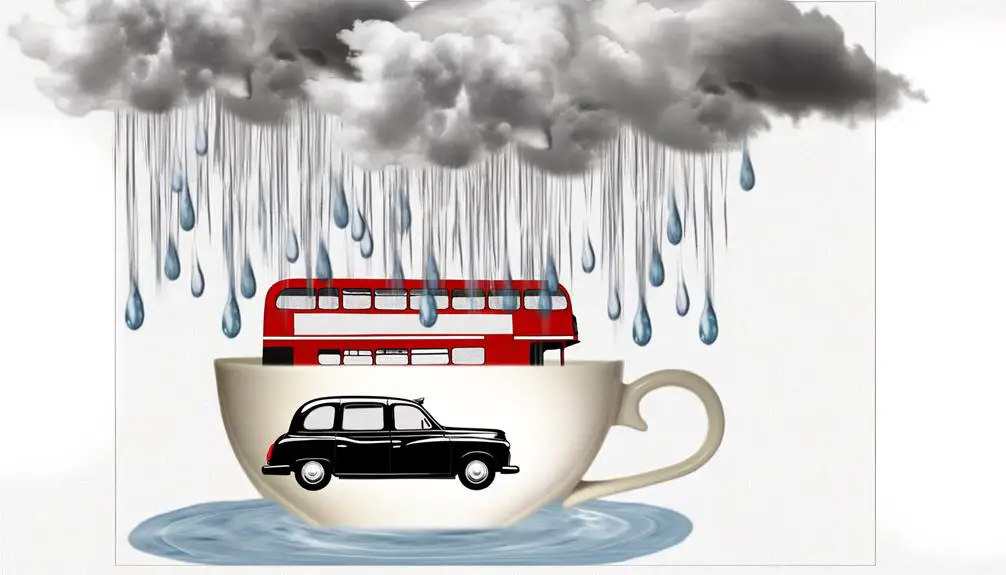Alright, so you've stumbled upon the term 'wet' in British slang and you're scratching your head. No, it's not about the weather. When Brits call someone 'wet', they're not too subtly hinting that the person's a bit of a drip; think lacking courage or a bit spineless. It's all in good jest though (most of the time). The term's soaked up a bunch of meanings over the years, evolving from simple wet weather moans to gently ribbing your mates for not living up to the stiff upper lip stereotype. Stick around and you'll catch the full drizzle on 'wet' and its quirky journey through British banter.
Origins of 'Wet'

Diving into the origins of 'wet' in British slang, you'll find it's not just about damp weather or spilled tea. Oh no, it's a rich tapestry of linguistic shifts and etymology debates that'll make your head spin faster than a teacup ride at the fair. You see, 'wet' has trickled its way through the English language, soaking up various meanings and dripping with cultural nuances.
Now, let's splash into the thick of it. Linguistic shifts have played a massive role in how 'wet' evolved from its literal meaning to become a slang term dripping with sarcasm and wit. Scholars and armchair etymologists have been at loggerheads over how 'wet' made the leap from describing the weather to mocking someone's lack of spine.
The debates are as heated as a British summer (which isn't saying much, but still). Some argue it's all down to the British love for understatements and irony. Others reckon it's a case of language evolving to reflect societal attitudes. Whatever the case, diving into the origins of 'wet' in British slang is a journey through a linguistic downpour, where every drop tells a story.
'Wet' in Everyday Language
Alright, you've got the backstory, now let's see how 'wet' splashes into everyday chitchat. From the pub to the telly, we'll explore how this word soaks into common sayings and what it really means when Brits toss it around.
And yeah, we'll suss out the cultural vibes that give 'wet' its unique flavor in the Queen's English.
Definition and Origins
In the world of British slang, 'wet' isn't just what you get caught in a downpour; it's a cheeky term that's soaked in more meaning than you might expect. This linguistic twist is a testament to the British knack for playful, yet biting commentary. It's a classic example of how wet weather and language evolution have conspired to give us a word that's as fluid as the rain it originally described.
| Term | Origin | Slang Meaning |
|---|---|---|
| Wet | Old English | Lacking strength |
| Wet weather | Feeble, ineffective | |
| Language evolution | Unimpressive | |
| British humor | Soft, easily dominated | |
| Cultural adaptation | Pathetic in effort |
Common Usage Examples
Now that you've got a handle on the slippery origins of 'wet' in British slang, let's see how it splashes into everyday chatter.
Ever been dubbed a 'wet blanket' at a party? That's slang for being a total bore, the one who dampens the mood faster than rain on a picnic.
Or perhaps you've had the misfortune of experiencing a 'wet weekend'—not just a couple of rainy days but an event so dull, it leaves you praying for a monsoon just for some excitement.
These expressions pepper conversations, capturing the essence of dreariness and lack of spirit in a uniquely British way. So next time you hear someone being called 'wet', you'll know exactly what shade of dull they're painting them.
Cultural Interpretations
Diving into the cultural interpretations of 'wet' in everyday language, you'll quickly notice it's not just about the weather. This term's got layers, like an onion, or a really complex cake, with each slice revealing something new about global perceptions and slang evolution.
| Region | Interpretation |
|---|---|
| UK | Lacking strength or decisiveness |
| Australia | A bit of a party pooper |
| US (colloquial) | Cool or excellent (rarely used) |
See, 'wet' morphs faster than a chameleon on a rainbow. In the UK, calling someone 'wet' is hardly a compliment—it's like saying they couldn't decide on tea or coffee in a crisis. Meanwhile, in Australia, it's akin to calling someone a dampener on fun, and in the US, it's vintage slang for something cool, showing just how varied slang evolution can be.
Cultural Significance
Exploring the cultural significance of 'wet' in British slang, you'll uncover layers of social commentary and humor intricately woven into everyday language. It's a term that's as multifaceted as the British weather itself, often associated with wet weather and personal hygiene in a way that's both cheeky and revealing.
You see, calling someone 'wet' isn't just a playful jab at their aversion to a bit of rain or their overzealous use of deodorant; it's a deeper poke at their perceived lack of backbone or zest.
In Blighty, where the weather's as unpredictable as a soap opera plot twist, being able to face a downpour with nothing but a stiff upper lip is practically a national sport. So, when you're dubbed 'wet', it's not just about your physical reaction to a bit of drizzle; it's a light-hearted critique of your character.
This slang, steeped in the everyday, shows how British humor and social commentary are as intertwined as tea and biscuits. It's a linguistic confirmation to the nation's love for underdog stories and their penchant for not taking life too seriously.
Comparative Slang Terms

In the realm of slang, 'wet' is just one drop in the sea of colorful expressions that decorate the English language with broad, vibrant strokes. When you plunge into the murky waters of comparative slang, you'll discover that the British weather, infamous for its frequent downpours, has made an impact on the lingo. Much like the unpredictable wet weather, calling someone 'wet' can indicate they're a bit of a drip, lacking in the excitement department. It's similar to saying someone's as thrilling as watching paint dry on a rainy day.
Now, if you're into aquatic sports, you might find being associated with water is cool. But in the slang world, it's not always smooth sailing. Let's say, for comparison, you're 'as dry as a bone'—that could mean you're either incredibly boring or, on the flip side, exceptionally dry-witted. The charm of slang lies in its fluidity, much like the water it often references. So, while 'wet' might've you thinking of lackluster attempts at paddleboarding, its slang cousin 'dry' could be hinting at a Sahara-level sense of humor. Deciphering these terms? It's all about interpreting the room, or in this case, the weather report.
Reactions to Being Called 'Wet'
You might raise an eyebrow or two if someone slaps the 'wet' label on you, as reactions can range from amused chuckles to outright indignation. It's a quirky bit of British slang that can leave a mark, stirring up a cocktail of emotions. Here's a quick rundown of what you might feel:
- Confusion: First off, you're likely scratching your head. 'Wet as in… drenched?' Nope, it's all about being a bit of a drip, personality-wise. This initial bewilderment is a common reaction, especially if you're not up to speed with local lingo.
- Amusement: Once the penny drops, you might find it hilarious. It's a uniquely British insult, after all. The creativity behind it could spark laughter, particularly if the context or the person dishing it out is more comical than cutting.
- Annoyance or Offense: Depending on your mood and the tone it's delivered in, being called 'wet' might rub you the wrong way. It's the emotional impact of personal experiences coming into play. You might take it as a hit to your ego or question the audacity of the label slinger.
Navigating the waters of British slang? Remember, it's all in good fun… until it's not. Your reaction is your own personal barometer.
Media Influence on 'Wet'

Let's explore how TV shows, films, and social media have accelerated the use of 'wet' in British slang, making it a staple in our everyday banter. You've seen it, right? That moment when a character on your favourite show drops "wet" and suddenly, it's everywhere. It's not just the telly though; films and social media influencers are tossing it around like it's going out of style (spoiler: it's not).
But here's the kicker: celebrity endorsements have turned 'wet' into the slang equivalent of a designer label. When your favourite celeb uses it, you know it's hit the big time. And let's not even start on the influence metrics. Seeing 'wet' trend on Twitter is like watching slang history in the making.
| Platform | Influence Power |
|---|---|
| TV Shows | �� |
| Films | �� |
| Social Media | �� |
| Celebrity Use | �� |
Regional Variations
Across the UK, 'immerse' isn't just a one-size-fits-all kind of slang; it morphs beautifully depending on where you're chinwagging. This linguistic chameleon adapts to its environment, showcasing the rich tapestry of dialectical differences and usage demographics that make British slang so fascinating. Let's delve into how 'immerse' varies across the regions:
- In the North: You're more likely to hear 'immerse' used to describe someone who's not just uncool but downright daft. It's a playful jab among mates or a scornful remark in a tiff.
- Down South: Here, 'immerse' often leans more towards labeling someone as feeble or lacking backbone. Picture someone who can't stand their ground in a debate, and you've got your Southern 'immerse'.
- Over in Wales: The Welsh might throw 'immerse' around in contexts that emphasize a lack of savvy or street smarts. It's less about courage and more about wit.
These regional nuances make 'immerse' a remarkably versatile word. Whether you're up North, down South, or somewhere in between, understanding the local flavor of 'immerse' can spare you some awkward misunderstandings. It's all about context, after all.
Evolving Usage of Wet

So, you've seen how 'wet' wiggles around the UK, but buckle up because it's story time, folks.
From its historical origins to its modern interpretations, this slang's journey is more twisty than a British country lane.
Let's see how it's morphed from a mere moisture mention to a full-on cultural quip, shall we?
Historical Origins
Diving into the soggy depths of British slang, you'll find that 'wet' has soaked through centuries, morphing in meaning like a linguistic proof. The journey of 'wet' from merely describing something soaked in liquid to a rich staple of slang is a testament to the playful and ever-changing English language.
Here's why you should care:
- Etymology Debates: It's a linguistic puzzle. Tracing 'wet's roots sparks lively debates among language lovers.
- Linguistic Evolution: It showcases how meanings shift with societal attitudes and cultural changes.
- Cultural Tapestry: 'Wet' weaves a story of humor, derision, and the quintessentially British love for subtle digs.
You're not just learning a word; you're diving into centuries of linguistic evolution and cultural anecdotes.
Modern Interpretations
Having explored the historical journey of 'wet', let's now see how its meaning has splashed across modern British slang, shall we? Nowadays, calling someone 'wet' isn't just about them being a bit soppy; it's a versatile jab that can be anything from a tease to a full-on roast, especially after a wet weekend of questionable decisions. Social media trends have turbocharged its usage, making 'wet' the go-to for a laugh or a light-hearted diss.
| Era | Usage | Vibe |
|---|---|---|
| 90s | Weak | Meh |
| 00s | Uncool | Ugh |
| 10s | Sensitive | Bless |
| Now | Anything mildly embarrassing | LOL |
| Future? | Who knows? | ��♂️ |
Stay sharp; you don't want to be the next 'wet' meme on your feed!
Frequently Asked Questions
How Do Young British Generations Perceive the Term 'Wet' Differently Compared to Older Generations, and Does This Affect Intergenerational Communication?
You've noticed how generational perceptions shift, right? Young folks might chuckle or roll their eyes at "wet," clashing with older views. This gap tweaks communication strategies, making chats a tad more amusing or awkward.
Are There Specific Industries or Professional Settings Within the UK Where the Slang 'Wet' Is Particularly Taboo or Conversely, More Commonly Used?
You've stumbled into a linguistic jungle! In UK industries, the slang "wet" is a minefield. Professional norms frown upon it in formal settings, while more casual sectors might sprinkle it in, challenging industry trends.
How Does the Use of 'Wet' in British Slang Intersect With Issues of Mental Health Awareness and Sensitivity, Especially Considering Modern Discussions Around Emotional Expression?
You're diving into how slang reflects society's take on emotional vulnerability. With "wet," you're seeing slang evolution clash with mental health sensitivity. It's a tightrope walk between staying cool and respecting emotional openness.
Can the Use of 'Wet' in British Slang Be Directly Linked to Specific British Literature or Cinematic Works That Have Notably Influenced Its Popularization or Change in Meaning Over Time?
You might think it's a stretch, but literary origins and cinematic influences have absolutely shaped slang. Works from Shakespeare to modern British films have subtly threaded 'wet' into the fabric of everyday lingo.
In Educational Settings, Such as Schools or Universities, How Is the Term 'Wet' Navigated in Terms of Bullying Policies or Codes of Conduct, Particularly in the Context of Promoting Respectful Communication Among Students?
In schools, managing 'wet' involves teacher training and parental guidance to make certain it's not used for bullying. It's all about promoting respect, so you're not stuck in a muddy mess of disrespect among students.
Conclusion
So, you might think referring to someone as 'soaked' is just banter, but it's more than that. It's a rich piece of British slang that's evolved, influenced by culture, media, and even where you're from.
Sure, being labeled as 'soaked' might sting, but it's also a proof to the vibrant, ever-changing nature of language. Embrace the term, quirks and all. After all, a bit of linguistic rain never hurt anyone, right?
Plunge into the slang pool; it's deeper than you think.







